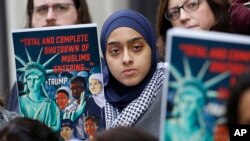U.S. President Donald Trump added six countries to his administration’s travel ban on Jan. 31 — Nigeria, Eritrea, Myanmar (Burma), Kyrgyzstan, Tanzania and Sudan.
The amended executive order, which takes effect Feb. 21, still maintains restrictions on some citizens from Iran, Libya, Somalia, Syria and Yemen, along with Venezuela and North Korea.
Chad was previously subject to travel restrictions, but has since been removed from the list.
The Trump administration said the expanded list is vital to U.S. national security and ensures countries meet security standards.
What do these restrictions mean to citizens of the newly added countries?
Travel restrictions affect each country differently. Trump’s proclamation bars most citizens of Nigeria, Eritrea, Myanmar (Burma) and Kyrgyzstan from obtaining immigrant visas that can lead to permanent U.S. residence, also known as green cards that allow people to work and live in the United States. Immigrant visas include people who are sponsored by family members, employers or are part of the diversity visa program, sometimes referred to as the green card lottery.
Citizens of Sudan and Tanzania are not allowed to participate in the diversity visa program, in which a limited number of visas are available each year for citizens of countries with historically low rates of immigration to the United States. In the most recent lottery, the diversity visa program distributed 55,000 visas among six geographic regions.
According to the U.S. Department of Homeland Security, the new travel restrictions were imposed on six countries that “failed to meet a series of security criteria” and do not “comply with the established identity-management and information-sharing criteria” or are part of a recalcitrant country list — nations that refuse to take back their nationals when the U.S. wants to deport them.
Though citizens of Myanmar (Burma), Eritrea, Kyrgyzstan and Nigeria are barred from getting standard immigrant visas, some may qualify for a special immigrant visa given to those who have provided assistance to the U.S. government.
Can travelers get waivers to the travel ban?
Yes. Applicants are automatically considered for a waiver based on their visa application, a process already established under Trump’s existing ban. However, a federal lawsuit is challenging the waiver process, alleging it is difficult to navigate.
What about non-immigrant visas?
People traveling to the U.S. for a temporary stay will be unaffected, including people with tourist or business visas, or those seeking medical treatment.
How does the expanded list compare to those nations originally placed on the travel ban?
North Korea and Syria nationals are currently banned of all immigrant and non-immigrant visas. Iranian citizens are not allowed to receive immigrant or non-immigrant visas except student and exchange visitor visas. Libya and Yemen are suspended from getting immigrant and tourist visas.
Somali nationals are banned from receiving immigrant visas and certain Venezuelan government officials are not permitted to receive tourist visas.
What has been the impact of the travel ban?
Since taking office, Trump has issued three versions of his travel ban. The previous two versions were temporary. The current ban has no expiration date and has been challenged in federal courts, with immigrant advocates saying it amounts to a Muslim ban, a charge the administration denies. After much litigation, on June 26, 2018, a version of the ban was upheld by the U.S. Supreme Court.
Immigrant rights groups say travel restrictions also affect families already living in the U.S.
“Since many people seeking immigrant visas are trying to reunite with U.S. citizen family, U.S. families and communities will suffer from the ban, not just nationals of these countries,” according to Grace Meng, senior researcher at Human Rights Watch.
Is Congress doing anything?
Immigrant advocates have called on Congress to ratify the No Ban Act to rescind the travel restrictions. The bill, introduced in Congress in April 2019, would limit the president's authority to suspend or restrict aliens from entering the United States.
The new travel restrictions take effect Feb. 21, but those who are in transit to the U.S. on that date or have received U.S. visas will be exempted. Those who have not received visas will be subject to the restrictions but can be considered for waivers.




